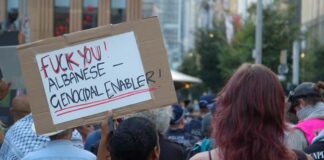Antony Loewenstein’s new book, The Palestine Laboratory, looks at Israel’s military cyber industrial complex and its role as one of the world’s biggest arms dealers and seller of some of the most invasive software. He talked to Solidarity
Throughout the book you use the term ethno-nationalism. What do you mean by that?
Israel, I would say, is the most “successful” ethno-nationalist state in the world.
It’s a proudly Jewish supremacist state. If you’re not Jewish—if you’re a Palestinian, Christian, Muslim—you’re not given the same rights both within Israel proper, but also obviously in the West Bank and Gaza. Ethno-nationalism essentially is the supremacy of one group or race over another.
Israel has become a model to a range of other countries and groups around the world.
India’s Prime Minister Modi, who’s been there since 2014, is creating a Hindu fundamentalist state. There’s roughly 200 million Muslims in India who are treated as second class citizens. There have been pogroms and an attempt to disenfranchise Muslims.
Among groups on the far right often you find Israeli flags, not because they like Jews, but because they admire what Israel is doing and want to create something similar. I quote Richard Spencer, a notorious alt right leader in the US, who says he’s a white Zionist. He wants to create a Christian ethno-nationalist state within the US.
Indian officials openly say that they admire what Israel is doing in the West Bank, bringing in Jewish settlers to Palestinian land, which is what India is trying to do in Kashmir, to bring Hindus to settle Muslim majority areas. India gets huge amounts of weapons from Israel to the point where I think there’s not just a defence agreement, but an ideological alignment.
Can you talk about how intertwined Israel’s military and its weapons and cyber industries are?
Since the founding of the state in 1948, David Ben-Gurion, the first prime minister, saw the need for Israel to make friends. That often meant military alliances and selling weapons. After 1967, when the occupation began in the Golan Heights, East Jerusalem, the West Bank and Gaza, Israel would proudly promote its work in so-called counter-insurgency against Palestinians as a selling point.
Some of the most repressive regimes in South America during the Cold War that were committing gross human rights abuses would openly say that they wanted the know-how that Israel was apparently learning by managing and occupying Palestinians to control their own populations.
Central to Israel’s development were transactional friendships selling huge amounts of weapons. From the 1970s onwards, Israel, always a close ally of the US, became almost America’s wing-man. If there was a controversy or some reason the US Congress couldn’t sell weapons to a country, Israel would fill the breach. So Israel’s arms industry could thrive alongside the US.
Israel has now sold defence equipment to over 130 nations. I think ultimately they see it as an insurance policy. There is growing opposition to the occupation of Palestine among the general public in the US, parts of Europe and Australia.
It’s hard to see any real pressure being placed on Israel to end its repression when so many nations rely on Israeli technology and spyware for their day to day activities for oppressing their own people.
The European Union might issue the occasional press release saying, don’t expand settlements. The US under Biden might express displeasure with the occupation.
But practically it doesn’t mean anything. The EU is still Israel’s biggest trading partner.
Figures for the Israeli defense industry found $12.5 billion of weapons were sold in 2022, the highest ever. A quarter [of that went] to Arab autocracies, the UAE, the Saudis, the Bahrainis—that’s spyware, drones, a range of other tools and technologies which are used to oppress their own people.
These are nations that years ago opposed Israel, militarily and diplomatically. I would argue that the Israeli defense industry and spyware has changed that. I’m not saying the Arab people have changed their views. But the Arab elites in general love Israel.
The US is the world’s biggest arms dealer, Israel is now 10th. Other nations sell more, such as France and Russia. But Israel is a tiny nation with a very small population.
Pegasus is the most notorious Israeli spyware, produced by a company called NSO Group, which has been selling spyware to dozens of countries. If it’s on your phone, it can control your microphone and camera even when the phone is off.
This is not some rogue company that Israel can’t control selling to dictatorships. It’s an arm of the state. Netanyahu and Mossad, the intelligence services from Israel, will go to countries like Rwanda, Saudi, UAE, India and hold out tools like Pegasus as a diplomatic carrot.
Everyone’s completely addicted to it, law enforcement, police, military intelligence.
The companies say, we’re just helping nations go after terrorists and criminals and pedophiles. The problem is, it doesn’t stop there.
US support for Israel is even today absolutely vital. It’s often assumed that Israel is so reliant on the US it would never bite the hand that feeds it. But in the book you describe times when Israel has spied on the US, and Israeli businesses breaking US embargoes on nations in order to sell weapons and software. Can you talk about how the US and Israel interact?
It’s wrong to suggest it’s only because of the Israel lobby that Western support for Israel is uncritical.
The Israel lobby is real. It pressures Republicans and Democrats. But there is general bipartisanship on this issue in the US.
The US and Israel are close friends, they rely on each other. But they also don’t trust each other. There are at least 350 or 400 Americans in the NSA, the leading intelligence gathering arm of the US government, spying on Israel every day.
Israeli spyware, Pegasus, has been found on American diplomatic phones in Africa particularly. And this upsets the US.
So the US administration has put sanctions on NSO group. I see what’s happening as America wants complete global dominance in the spyware industry and Israel is challenging that dominance.
When you have dozens of countries buying Israeli spyware relatively cheaply that challenges American dominance. America and its five eyes allies, the intelligence partnership between the US, UK, Canada, New Zealand and Australia, are very upset with Israeli spyware proliferation.
Could you take us through how Israeli cyber espionage tools are used? And is Pegasus being used in Australia?
As far as we know, it’s not. I’ve done some reporting about this on Declassified Australia.
I recently searched the Austender website, where contracts with the Australian Government are listed. In the last roughly 12 years there were close to 130 contracts between Cellebrite, another Israeli company, and virtually every single Australian government department.
Its most notorious tool is a phone hacking tool. A lot of law enforcement around the world use it.
Sometimes that could be benign. It’s been used around the Brittany Higgins case, and Gladys Berejiklian and Daryl Maguire inquiry.
But Services Australia uses Cellebrite to go after welfare recipients. There was a case that came out a few months ago [where it] was used to go after a woman to check whether she was in a relationship.
One of the most infamous cases was the use of Pegasus on Jamal Khashoggi, the Saudi writer who was killed in 2018 by the Saudis and dismembered in the Saudi consulate in Istanbul.
Pegasus had been on his phone, his friends’ phones, his wife’s phone, girlfriends’ phones. He was being watched and monitored by the Saudis with a tool that had been sold to them by the Israelis. It seems pretty clear that the Saudis knew so much about his movements principally because of this spyware.
So I very much see Israeli actions as perpetuating repression and propping it up.
Israel poses itself as an oasis of democracy. And alongside this, we’re seeing antisemitism being redefined as being anti-Israel. Whereas antisemitism should be understood as racism towards Jews, it’s now understood as hostility to Israel. That’s really the core of the IHRA definition.
Antisemitism is real. It is a growing threat in parts of the world, with violence against Jews and synagogue shootings in the US.
But the key Israel lobby groups in the US and Australia are now trying to weaponise antisemitism against anti-Zionists who are critical of Israel.
But if you believe that Israel’s existence from its birth has been one of subjugating Palestinians, that’s a legitimate point of view.
It’s like saying Australia birth was illegitimate as a British colonial state. This is not unique to Israel. The problem that Israel has as a Jewish supremacist state is equally [the problem] with any other ethno-nationalist state.
A few years ago, a quarter of young American Jews said [they believed] Israel was practising apartheid against Palestinians. You wouldn’t have had those figures 20 years ago.
These days, the racism against Palestinians is so open that it’s helping more people to recognise Israel [for what it is].
You currently have an Israeli government that has members of the Cabinet openly advocating ethnic cleansing against Palestinians.
In the last six months, there’s been huge protests in Israel against the current government. But there are barely any Palestinians marching at all. Israeli Jews who are on the anti-occupation left are often not even allowed to march because the main organisers won’t let them wave a Palestinian flag or call for the end of the occupation.
The change will not come from within. The occupation is deepening and has never been more permanent. It’s getting more violent against Palestinians. So international pressure to me is the only way this will ever end.






